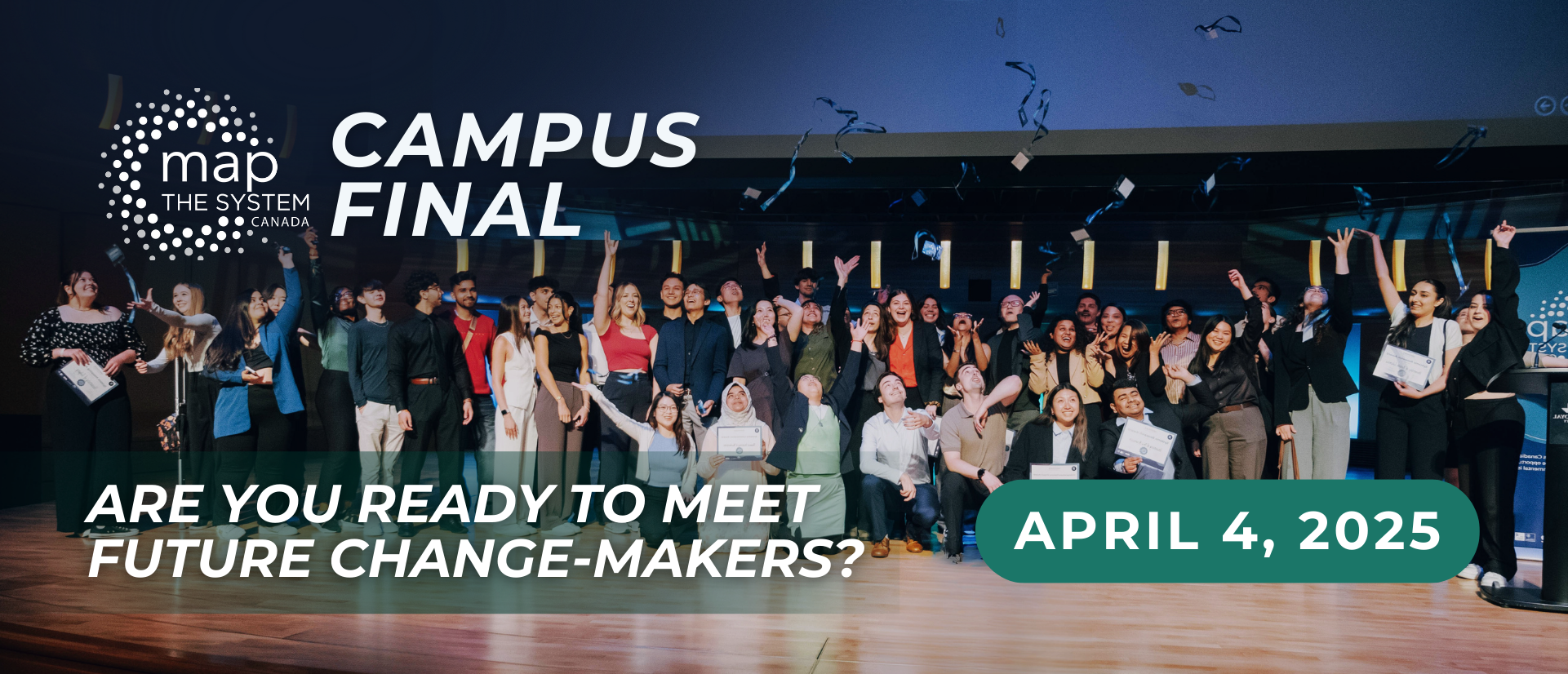The campus final on April 4, 2025, featured MRU’s top 6 student teams tackling complex social and environmental challenges using a systems-thinking approach.
Meet the MRU Top Teams
As part of the Map the System Canada 2025, the winning team will represent MRU at the Banff Systems Summit in May and potentially the Global Finals in Oxford this July!
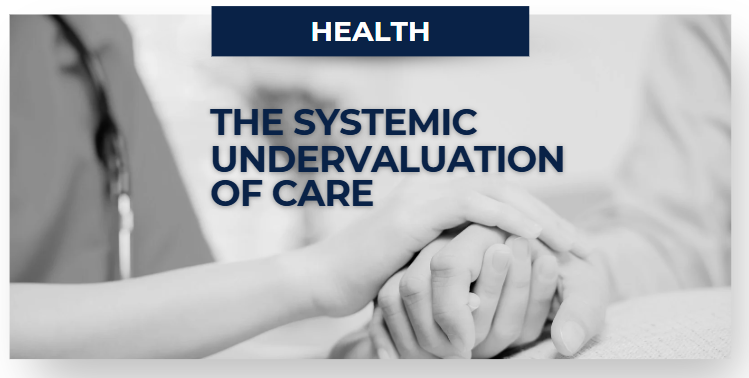
MRU Winner - The Systemic Undervaluation of Care
Awards: Most Thought-Provoking and Most Impressive Systems Map.
Students: Grace Moore and Damon Vennard
Description: Care is everyday, essential work. Yet the dominant mental models related to care work fail to reflect this essential nature, leading to the systemic under-appreciation and undervaluation of both paid and unpaid care work. Care work, defined as the everyday labor to maintain people and populations, exists at the intersection of emotional, physical, and societal dimensions, with its meaning shifting based on context and perspectives. Our central argument is that dominant mental models fail to recognize the essential nature of care work, leading to the systemic undervaluation of both paid and unpaid care work. This undervaluation results in caregivers facing challenges such as burnout and economic vulnerability. The project utilizes a feminist and intersectional perspective to investigate systemic inequities, intersecting identities, and opportunities for meaningful change. It explores the roots of societal norms and gender roles that contribute to the undervaluation of care work, and identifies potential leverage points for shifting perceptions, policies, and practices. Key research themes include gender inequalities, emotional and cognitive labor, and economic vulnerability for caregivers. Insights from expert interviews highlight the structural issues within healthcare systems that impact the quality of patient care and the well-being of care workers. The research also considers the experiences of marginalized groups, such as immigrant women, who face compounded challenges in care work. Ultimately, this project aims to promote a more equitable future by addressing the systemic undervaluation of care work and fostering support for caregivers.

MRU Runner-up: Cracking the Code of Women in Tech
Awards: Most Impactful Storytelling and Most Impressive Research
Student: Nicole Ranieri
Description: Women continue to be underrepresented in the tech industry globally, nationally, and locally. Despite decades of initiatives aimed at increasing women's participation, progress in the tech labour market has been limited. Where traditional interventions have fallen short, systems thinking offers a new lens to understand and address the root causes of this persistent gap.

Why are Youth in Canada Disconnected? - Team Apathy Trap
Students: Dana Dutton, Hallie Vermette, and Naheel Al Sourani
Description: As members of Gen Z, we have noticed our peers are disconnecting and disengaging from society. Technology is a major driver of apathy and is causing Gen Z to disengage from community, society, and politics. Feelings of helplessness about the world inhibit us from acting to create meaningful change. Throughout our research, we have discovered apathy is a complex and contextual issue, making it difficult to address.
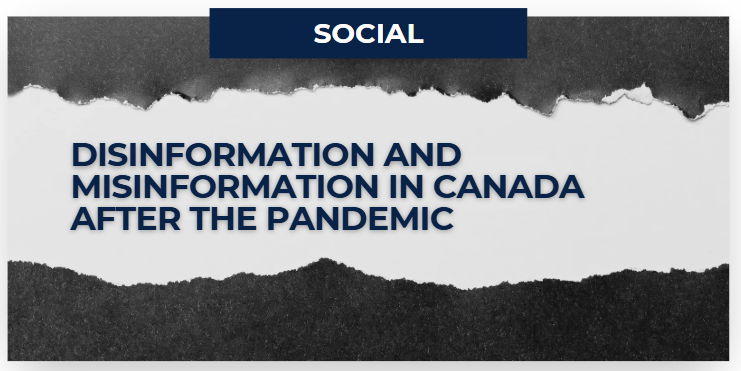
Disinformation and Misinformation In Canada After the Pandemic - Team The House Hippo
Student: Isaiah Haughton
Description: A study of how communications have been challenged in Canada and has taken studies from experts, academic resources and Statistics Canada.
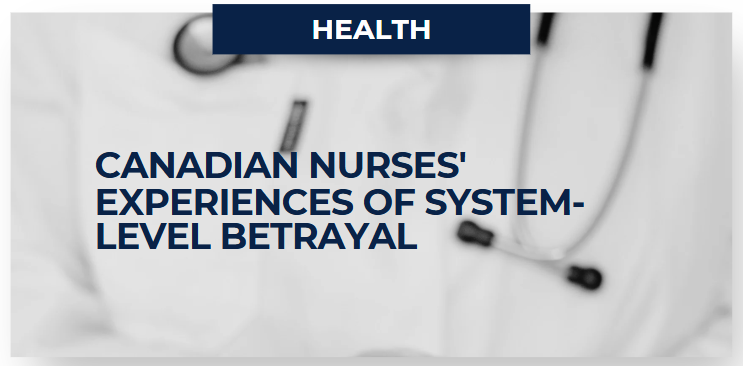
Canadian Nurses' Experiences of System-Level Betrayal: A Review of the Effects of Organizational Failures and Misaligned Policies in Healthcare - Team Bright Lab
Students: Katelyn Bennett, Isabel Melendez, Cristina Nguyen, Matthew Rennick, Zakari Mulrooney
Description: Betrayal is defined as an infringement of trust between people through accidental or intentional actions that negatively impact relationships (Brewer, 2021; Parse, 2010). However, betrayal can also occur institutionally at a systems level, known as system-level betrayal (SLB). SLB is defined as a violation of trust among members of an individual or collective organization committed against another individual (Brewer, 2021; Bunkers, 2018; Christl et al., 2024). One population that system-level betrayal occurs in is Canadian nurses. Canadian nurses experience system-level betrayal when the healthcare system and its individuals fail to address or prevent responses or events that contribute to interpersonal trauma among nurses (Christl et al., 2024). Many challenges arise from SLB, such as the failure of healthcare systems to adequately support nurses and placing them in stressful environments that negatively impact their well-being. SLB develops from various factors, including unsafe working conditions and misaligned policies. These root causes then have negative impacts, such as unsafe working conditions, inadequate staffing, punitive measures, and stigma, leading to mental health conditions, burnout, and mental distress. To mitigate these effects, micro and macro solutions need to be implemented in order to protect our nurses in Canada, especially after the COVID-19 pandemic. Valuing staff, creating proper policy, and mentoring peers are needed solutions to mitigate the effects of SLB and reduce the levels of burnout and moral distress.
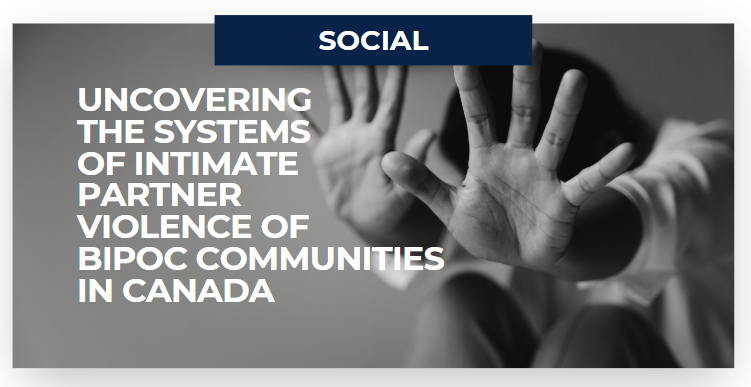
Uncovering the Systems of Intimate Partner Violence of BIPOC Communities in Canada
Students: Mohamad Kamel, Cameran Christianson, and Laura Gonzalez
Description: As a team, we chose to foreground survivor-led, culturally rooted responses because we believe those closest to the harm are also closest to the solutions. This project was not about speaking for communities, it was about listening, learning, and mapping the systems that continue to fail them. Our hope is not only to share insights but to carry forward a commitment to accountability, cultural humility, and decolonial action in everything we do.
Meet The Judges

1. Heather Nelson
As a judge, Heather draws on her expertise in Canadian insurance history, including public auto insurance and industry responses to climate events. Her work as an expert witness informs her systems-thinking approach to evaluating solutions.
Heather Nelson holds a Ph.D. in Canadian business history from McMaster University, is an internationally published scholar and certified expert witness in Canada’s insurance history. Her work includes Studies on the history of automobile insurance, contemporary food security within universities and is currently working on a project that examines housing insecurity in an era of climate change-related insurance increases.

2. Kaitlyn Squires
As a judge, Kaitlyn draws from her experience participating in the program as MRU’s campus final winner in 2022, competing at both the Canadian finals and global level in Oxford, and through her mentorship of several past teams.
Kaitlyn Squires (she/her) is a health systems researcher with the EQuIS Research Platform, working to improve equity, quality, and safety in healthcare across Canada and internationally. Kaitlyn is deeply passionate about social change and systems thinking, and has been able to bring these passions into her work with many great organizations, including the Mood Disorder Association of Canada, Alberta Health Services, Ocean Wise, the Alberta Council for Global Cooperation, and the Catamount Fellowship of the Institute at MRU. She will be pursuing a PhD in the fall focusing on systems thinking and public health.
3. Jillian Mah
As a judge, Jillian draws on her experience as a 2020 global winner and her work in social innovation. She brings a thoughtful, community-driven approach to evaluating solutions with expertise in strategic analysis, human-centered design, and systems thinking.
Jillian Mah is a strategist and consultant who specializes in tackling complex social challenges through systems thinking, human-centered design, and data-driven strategy. With a background spanning social policy, business strategy, design, and innovation, they work at the intersection of insight and action—helping organizations understand root causes, reframe problems and design impactful, community-aligned solutions. At HelpSeeker Technologies, her work includes support governments and social sector leaders in navigating complex social ecosystems. She focuses on delivering actionable insights, shaping policy, and co-developing strategies that drive systemic change and strengthen community resilience.
Questions about the Map the System and the Campus Final?
Return to Map the System MRU Main Page or Contact program lead Nicole Darnayla at idarn171@mtroyal.ca


